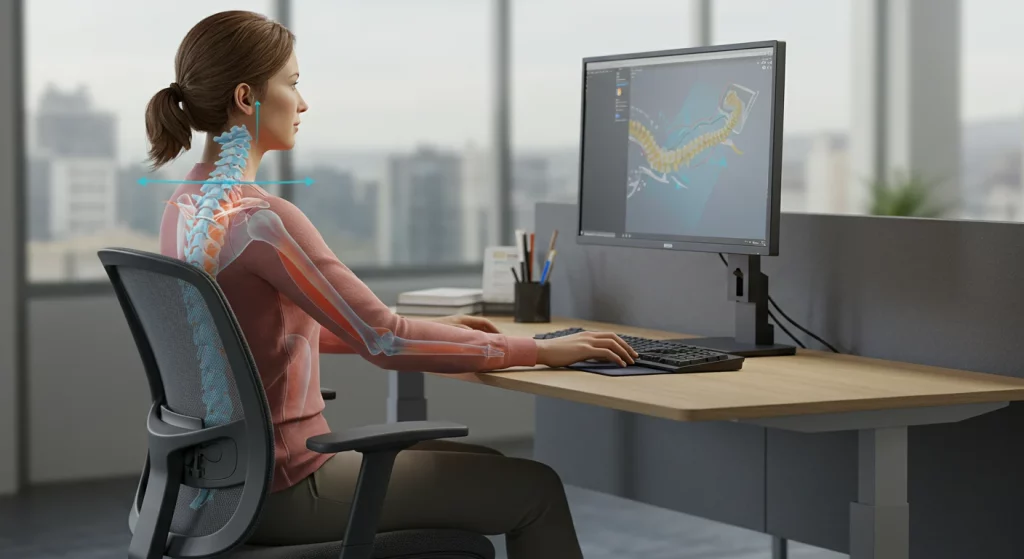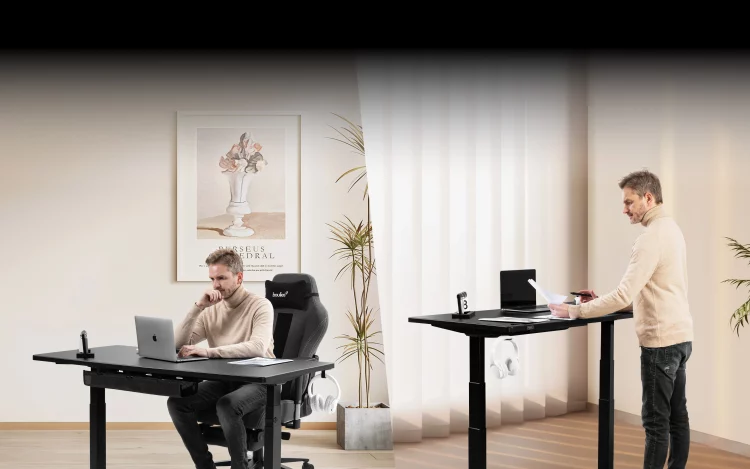Posture as Emotional Language
Posture is often overlooked in discussions about emotional health, dismissed as a matter of etiquette or physical presentation. But emerging evidence from neuroscience, psychophysiology, and integrative medicine is painting a more complex picture—one in which the way we hold our bodies doesn’t just reflect how we feel but actively influences our emotional state. Your posture is not simply a static structure governed by bones and muscles; it’s a dynamic, living expression of your internal world. From ancient yogic teachings to modern biopsychosocial models of pain and emotion, posture is now seen as a bridge between the brain, body, and behavior. If you slump in sadness or stand tall in confidence, it’s not coincidence—it’s biology.
The Biomechanics of Emotion
The spine, composed of 33 vertebrae supported by an intricate network of muscles, fascia, and nerves, functions as more than a structural support column. It is a sensory organ, housing the spinal cord—the central highway for brain-body communication. When posture becomes misaligned due to habitual slouching, forward head carriage, or rounded shoulders, it sends different proprioceptive feedback to the brain. That feedback shapes your nervous system’s interpretation of safety, power, and vulnerability.
Research from the field of embodied cognition suggests that the brain interprets physical states as emotional cues. For instance, when the body is compressed, with the chest caved in and the shoulders rolled forward, the brain associates this with submission, fatigue, or defeat. Conversely, when the spine is lengthened, chest open, and chin level, the body communicates alertness, pride, and resilience. These physical patterns influence hormone levels, heart rate variability, and even how memories are encoded or retrieved.
Posture and the Autonomic Nervous System
One of the clearest pathways through which posture affects emotion is via the autonomic nervous system (ANS), which regulates physiological functions like heart rate, digestion, and stress response. The ANS has two primary branches: sympathetic (fight-or-flight) and parasympathetic (rest-and-digest). Your posture can influence which branch is dominant.
Poor posture—especially thoracic kyphosis and forward head position—places mechanical strain on the cervical spine and upper thoracic region. This strain can irritate the vagus nerve, a key component of the parasympathetic nervous system. Impaired vagal tone has been linked to increased anxiety, poor emotional regulation, and inflammation. On the other hand, upright posture enhances vagal tone, promoting a sense of calm, connection, and clarity.
A 2015 study published in Health Psychology showed that participants who adopted upright seated postures during stressful tasks reported more positive mood, higher self-esteem, and lower fear compared to those who slouched. These findings suggest that posture is not just a downstream reflection of emotional states—it’s an upstream regulator.
Posture and Hormonal Shifts
In a now-famous (and sometimes debated) study by Amy Cuddy and colleagues at Harvard Business School, adopting “power poses” for just two minutes led to significant increases in testosterone and decreases in cortisol. Testosterone is associated with confidence, dominance, and assertiveness, while cortisol is the body’s primary stress hormone. Although later studies have challenged some of Cuddy’s hormonal findings, subsequent research continues to support the behavioral and subjective benefits of expansive postures.
This phenomenon is not limited to social psychology labs. In clinical settings, patients with postural dysfunctions such as kyphosis (exaggerated upper spine curvature) or scoliosis often report increased rates of depression and social withdrawal. Chronic poor posture may dysregulate neuroendocrine function, reinforcing a loop of low energy, poor self-perception, and decreased motivation.
Musculoskeletal Tension and Emotional Storage
The body is not just a passive vessel—it stores emotional residues. Muscles, especially those along the spine, carry the imprints of lived experience. Traumatic events, prolonged stress, and even habitual thought patterns manifest as muscular tension. The psoas, diaphragm, trapezius, and deep spinal extensors are particularly reactive to emotional states.
Somatic therapies and bodywork disciplines such as Rolfing, Alexander Technique, Feldenkrais Method, and craniosacral therapy operate on the principle that releasing chronic muscular contraction can liberate suppressed emotions. Clients frequently report unexpected waves of sadness, relief, or even joy during postural realignment sessions. This mind-body release confirms what many healers have long observed—your biography lives in your biology.
Confidence and Postural Expansion
Confidence isn’t just felt; it’s embodied. Expansive postures—chest lifted, spine elongated, arms open—are associated with increased feelings of capability, self-worth, and social boldness. These postures signal readiness and receptivity, both to the self and to others.
An upright posture also enhances voice projection, eye contact, and breathing efficiency—all of which feed back into the loop of perceived confidence. Studies in both humans and animals reveal that body posture influences hierarchical behavior. In professional environments, those with assertive postures are more likely to be perceived as competent and trustworthy.
For people struggling with anxiety or low self-esteem, simply practicing daily posture checks can lead to perceptual and behavioral shifts. Standing tall, even for a few seconds, offers a micro-dose of empowerment.
Shame and Postural Collapse
Shame is a heavy emotion, and it shows in the body. The classic “shame posture” involves lowered head, rounded shoulders, collapsed chest, and inward-turning feet. This protective configuration minimizes physical exposure and represents a non-verbal apology or retreat. While adaptive in certain social contexts, prolonged maintenance of this posture can reinforce the neural pathways of self-loathing and withdrawal.
Children who grow up in environments where they feel unsafe, criticized, or rejected often develop postural habits that reflect chronic shame. Over time, these patterns become so ingrained that the posture becomes the person’s baseline. Therapeutic modalities that include somatic awareness, like trauma-informed yoga or somatic experiencing, work to uncouple these posture-emotion loops and replace them with embodied safety.

Posture, Breath, and Emotional Regulation
Breathing is the physiological linchpin between posture and emotion. When posture collapses, breathing becomes shallow and restricted, particularly in the lower lungs and diaphragm. Shallow breathing activates the sympathetic nervous system and contributes to feelings of panic, restlessness, or numbness.
Postural alignment, especially of the thoracic and lumbar spine, supports full diaphragmatic breathing. Deep, slow breaths stimulate the vagus nerve and activate the parasympathetic response, leading to improved mood, clearer thinking, and decreased pain perception. This is one reason breath-focused practices like Qi Gong, Pilates, and yoga have such a potent effect on mood—they realign the posture, restore breath flow, and rebalance the nervous system.
Cultural and Social Influences on Posture and Mood
Cultural narratives also shape the postural-emotional relationship. In many societies, women are socialized to make themselves smaller—crossing legs, hunching shoulders, or avoiding eye contact—behaviors that manifest physically and emotionally. Men, conversely, may be conditioned to puff the chest or clench the jaw, which can lead to chronic musculoskeletal pain or emotional repression.
Awareness of these sociocultural imprints is crucial in postural work. Healing the posture is not just a physical act but a reclaiming of identity and space in the world. It requires unlearning patterns that no longer serve and embodying ones that foster authenticity and presence.
Chronic Pain, Depression, and Postural Feedback Loops
Depression is often described in psychological terms, but its posture is almost unmistakable: slow gait, downward gaze, collapsed spine. This configuration is more than symbolic—it actively reinforces the physiological hallmarks of depression. In contrast, correcting posture has been shown to improve energy levels, reduce pain perception, and improve outlook.
A 2017 study in the Journal of Behavior Therapy and Experimental Psychiatry found that participants with mild to moderate depression who sat in upright posture reported better mood and self-image compared to slouched participants. Postural adjustments helped reduce negative self-talk and increased resilience during stressful tasks.
This supports the idea that depression is not only a chemical imbalance or cognitive distortion but a whole-body experience. Treating it may require interventions that go beyond the mind and address the physical scaffolding of the self.
Integrative Approaches to Postural-Emotional Healing
To harness the full power of posture in emotional healing, a multidisciplinary approach is ideal. Physical therapy, chiropractic care, and somatic psychotherapy can work in tandem with mindfulness, movement-based practices, and cognitive-behavioral therapy.
- Alexander Technique: Improves postural efficiency through body awareness and neuromuscular re-education.
- Yoga Therapy: Combines postural alignment, breathwork, and mindfulness to restore physiological balance.
- Postural Restoration Institute (PRI): Focuses on re-patterning asymmetrical movement and breathing patterns.
- Somatic Experiencing: Addresses trauma through body awareness and nervous system regulation.
- Ergonomic Re-Education: Improves seated and standing postures in work environments to reduce emotional fatigue.
Daily practices can include wall posture checks, mindful walking, diaphragmatic breathing, and expressive movement to create a healthier posture-emotion loop.
Conclusion: Standing Tall, Feeling Whole
Your posture is more than a pose—it is a story. It tells the world, and more importantly, your nervous system, who you are, how you feel, and what you believe about yourself. Posture influences emotion not metaphorically but physiologically. It alters hormone levels, modulates neural circuits, and conditions the breath.
If you are feeling small, overwhelmed, or depleted, consider how your body is shaping your reality. Simple acts—lifting your chest, elongating your spine, grounding your feet—can initiate deep shifts in your inner world. Over time, posture becomes not just a reaction to your mood but a practice of reclaiming your power, dignity, and peace.







































